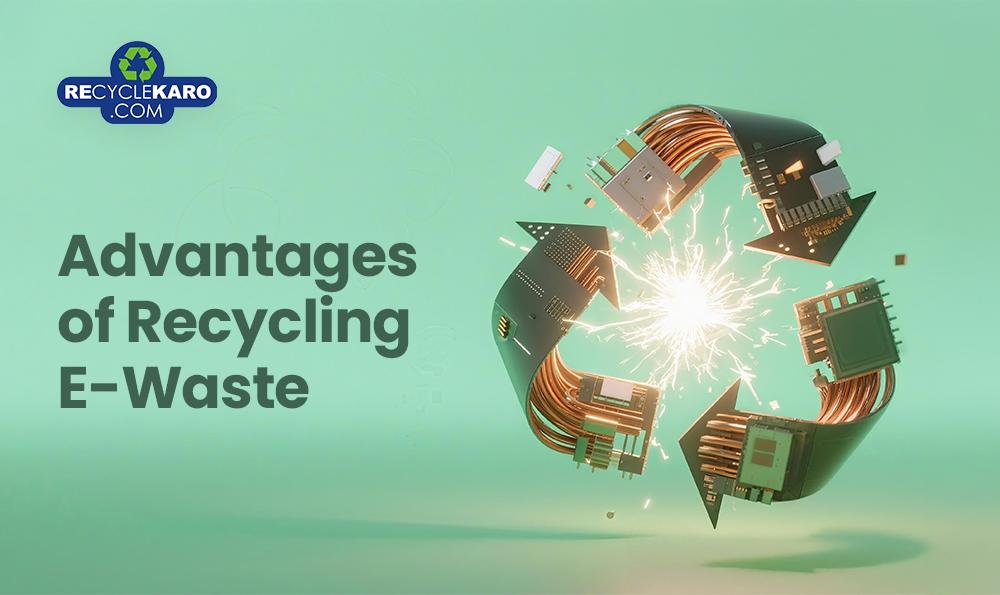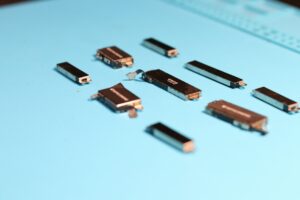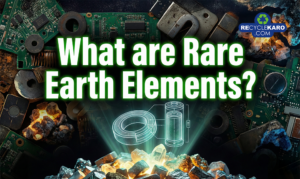10 Advantages of Recycling E Waste [2025]

Recycling e-waste offers significant environmental, economic, and social benefits, addressing India’s growing electronic waste crisis, which reached 3.2 million tonnes in 2023, per the Central Pollution Control Board (CPCB). Understanding the benefits of e-waste recycling is crucial for individuals, businesses, and policymakers. This blog explores 10 key benefits of recycling e-waste, highlighting how services like Recyclekaro’s scrap collection and lithium-ion battery recycling contribute to sustainability in India.
Key Takeaways to Reduce E-Waste in India
- Recycling e-waste helps conserves resources, reduces pollution, saves energy, and boosts India’s economy, among 10 benefits of recycling.
- By recovering materials like gold and lithium, preventing toxic leaks, and creating jobs, you can reduce environmental harm.
- Recyclekaro leads with CPCB-certified scrap collection, EPR credits, and 95% efficient lithium-ion battery recycling, per a 2024 IIT Bombay study.
- The advantages of recycling e-waste include supporting sustainability and health while minimising the disadvantages of e-waste, like pollution.
What Are the Advantages of Recycling E Waste?
Recycling e-waste conserves resources, reduces pollution, and generates employment opportunities. India, the third-largest e-waste generator globally, per a 2023 UN report, benefits immensely from recycling initiatives. By processing discarded electronics like smartphones, circuit boards and laptops, you recover valuable materials and prevent environmental harm, making it essential to understand the advantages of recycling e-waste.
- Key benefits: Resource recovery, pollution reduction, and economic growth.
- Scale: Only 10% of India’s e-waste is recycled formally, per CPCB.
- Your role: Partner with recyclers like Recyclekaro to maximise benefits.
Key Takeaway: Recycling e-waste drives sustainability and economic value.
How Does Recycling E-Waste Conserve Natural Resources?
Recycling e-waste recovers valuable materials like gold, copper, and lithium, reducing the need for mining. One tonne of e-waste yields 0.2 kg of gold, worth ₹50,000, according to a 2024 Recyclekaro report, showcasing the advantages of recycling e-waste. This process conserves finite resources and lowers energy use compared to raw material extraction.
| Material | Amount Recovered per Tonne | Economic Value (₹) |
| Gold | 0.2 kg | 50,000 |
| Copper | 20 kg | 14,000 |
| Lithium | 5 kg | 10,000 |
Pro Tip: Use Recyclekaro’s services to recover materials and enjoy the benefits of recycling e-waste.
Why Does Recycling E-Waste Reduce Environmental Pollution?
Recycling e-waste prevents toxic substances like lead and mercury from polluting soil and water. Improper disposal causes 90% of India’s e-waste to end up in informal sectors, per CPCB 2023, harming ecosystems. Recycling through authorised facilities like Recyclekaro ensures safe handling, highlighting the advantages of e-waste management.
- Toxic reduction: Keeps hazardous chemicals out of landfills.
- Water safety: Prevents contamination of groundwater sources.
- Soil health: Reduces soil toxicity in rural areas.
Key Takeaway: Safe recycling minimises environmental harm, a core benefit of recycling e-waste.
How Does Recycling E-Waste Save Energy?
You can reduce e-waste at home by repairing devices, using e-waste bins, and donating gadgets. For Recycling e-waste saves energy by reusing materials instead of mining new ones. Recycling one million laptops saves energy equivalent to powering 3,600 homes for a year, per a 2023 UN report, demonstrating what are the advantages of recycling. This energy efficiency supports India’s sustainability goals.
- Energy savings: Reduces mining energy by 70%, per IIT Bombay 2024.
- Carbon reduction: Lowers CO2 emissions from production.
- Scalability: Applies to devices like phones and batteries.
Actionable Step: Recycle devices with Recyclekaro to save energy and realise e waste advantages and disadvantages.
What Economic Benefits Come from Recycling E-Waste?
Businesses can reduce e-waste by adopting sustainable IT policies. Leasing devices reduces e-waste by ensuRecycling e-waste creates jobs and boosts India’s economy. The e-waste recycling sector employed 50,000 workers in 2024, per a Nasscom report, showcasing the advantages of recycling e-waste. Recovering materials reduces production costs, benefiting businesses and consumers.
- Job creation: Supports livelihoods in formal recycling.
- Cost savings: Recycled materials lower manufacturing expenses.
- Market growth: India’s recycling industry grew 12% in 2024.
Key Takeaway: Economic growth is a significant advantage of recycling e-waste.
How Does Recycling E-Waste Protect Public Health?
Recycling e-waste reduces health risks from toxic exposure. Informal recycling exposes workers to cadmium and lead, causing respiratory issues, per a 2024 Toxics Link study. Formal recycling, like Recyclekaro’s processes, ensures safe disposal, a key benefit of recycling e-waste.
- Worker safety: Eliminates hazardous manual dismantling.
- Community health: Prevents toxic leaks into water supplies.
- Child protection: Reduces child labour in informal sectors.
Pro Tip: Choose CPCB-certified recyclers to protect health and leverage the 10 benefits of recycling.
Why Is Lithium-Ion Battery Recycling a Key Advantage?
Recycling lithium-ion batteries recovers critical materials and reduces environmental harm. Recyclekaro’s facilities recover 95% of battery materials, like cobalt, per a 2024 IIT Bombay study, highlighting the advantages of e-waste recycling. This supports India’s electric vehicle growth while addressing battery waste.
- Material recovery: Recycles lithium and cobalt for reuse.
- Pollution control: Prevents battery leaks into soil.
- EV support: Sustains India’s clean energy transition.
Actionable Step: Contact Recyclekaro for specialised battery recycling to enjoy the benefits of recycling e waste.
How Does Recycling E-Waste Support a Circular Economy?
Efforts to reduce e-waste conserve resources, protect health, and promote sustainability. Recycling one Recycling e-waste promotes a circular economy by reusing materials in new electronics. Recyclekaro’s EPR credit system helps manufacturers meet 60% collection targets by 2025, per CPCB, showcasing what are the advantages of recycling. This reduces waste and demand for virgin resources.
- Material reuse: Recycled components enter new production cycles.
- Waste reduction: Lowers landfill use significantly.
- Business benefits: EPR compliance saves costs.
Key Takeaway: A circular economy is a major advantage of recycling e waste.
How Does Recycling E-Waste Enhance Corporate Sustainability?
Recyclekaro, a CPCB-registered leader in e-waste management, offers innovative services to reduce e-waBusinesses recycling e-waste improve their sustainability credentials. Partnering with Recyclekaro for scrap collection helps companies reduce e-waste by 20%, per a 2024 Nasscom report, aligning with ESG goals and showcasing the advantages and disadvantages of e waste management.
- Brand reputation: Signals environmental responsibility.
- Regulatory compliance: Meets E-Waste Management Rules, 2022.
- Cost efficiency: Reduces disposal expenses.
Pro Tip: Businesses can purchase EPR credits from Recyclekaro to enhance sustainability and realise e waste advantages and disadvantages.
Key Takeaway: Recyclekaro’s comprehensive solutions make it easy to reduce e-waste through professional recycling services.
What Role Does Recycling E-Waste Play in Community Empowerment?
The E-Waste Management Rules, 2022, mandate actions to reduce e-waste through EPR, requiring pRecycling e-waste empowers communities through education and collection drives. Recyclekaro’s 2024 Mumbai drives collected 3,000 tonnes, per local reports, showing the benefits of recycling e-waste. Engaging locals fosters awareness and sustainable habits.
- Education: Teaches communities how to reduce e-waste.
- Local jobs: Creates recycling-related employment.
- Community drives: Simplifies e-waste disposal.
Key Takeaway: Community empowerment is a vital advantage of e-waste recycling.
How Does Recycling E-Waste Support India’s Sustainability Goals?
Communities and NGOs can reduce e-waste through awareness campaigns and collection drives. Toxics LRecycling e-waste aligns with India’s Swachh Bharat and net-zero goals. Formal recycling increased by 15% in 2024, per CPCB, reducing landfill use and showcasing what are the advantages of recycling. Recyclekaro’s blockchain tracking ensures transparent processes.
- Policy alignment: Supports E-Waste Management Rules, 2022.
- Landfill reduction: Decreases waste accumulation.
- Global impact: Contributes to UN sustainability targets.
Actionable Step: Partner with Recyclekaro to support national goals and leverage 10 benefits of recycling.
What Are the Disadvantages of Not Recycling E-Waste?
Not recycling e-waste leads to environmental damage, health risks, and resource loss. Informal recycling causes 90% of India’s e-waste to pollute ecosystems, per CPCB 2023, highlighting the advantages and disadvantages of e-waste. Recycling mitigates these issues effectively.
| Disadvantage | Impact | Solution |
| Pollution | Contaminates soil and water | Recycle to avoid harm |
| Health risks | Exposes workers to toxins | Use formal recyclers |
| Resource loss | Wastes valuable materials | Recover through recycling |
Key Takeaway: Recycling e-waste prevents significant disadvantages.
How Does Recyclekaro Lead the Industry in Recycling E-Waste?
TechRecyclekaro leads India’s e-waste recycling industry through innovative services, robust certifications, and unmatched efficiency, making it a cornerstone for those seeking what are the advantages of recycling e-waste. With facilities processing 50,000 tonnes annually, Recyclekaro offers scrap collection, EPR credit solutions, and specialized lithium-ion battery recycling, driving the industry toward sustainability. Its compliance with the CPCB’s E-Waste Management Rules, 2022, ISO 14001:2015 for environmental management, and ISO 9001:2015 for quality ensures safe, transparent processes.
Recyclekaro’s blockchain-based tracking system, piloted in 2024, provides end-to-end traceability, setting a benchmark for the benefits of recycling e waste. In 2024, Recyclekaro collected 12,000 tonnes of scrap and facilitated 5,000 tonnes of EPR-compliant recycling, per CPCB data, helping businesses meet regulatory targets. Its rural outreach programs, collecting 2,000 tonnes in 2024, address infrastructure gaps, further showcasing the advantages of recycling e waste.
Compared to competitors, Recyclekaro’s 95% material recovery rate for lithium-ion batteries, per a 2024 IIT Bombay study, surpasses industry averages of 80–85%. Unlike smaller recyclers with limited certifications, Recyclekaro’s nationwide network and partnerships with municipalities and NGOs amplify its impact, making it the preferred choice for businesses and individuals aiming to realise e waste advantages and disadvantages.
Recyclekaro’s competitive edge lies in its scalability, transparency, and commitment to innovation, positioning it as India’s top e-waste recycler. While competitors may offer basic scrap collection, Recyclekaro’s integrated approach—combining EPR credits, advanced battery recycling, and community drives—delivers unmatched value. Its facilities use AI-driven sorting, improving efficiency by 25%, per a 2024 IIT Bombay study, compared to manual processes used by many competitors. Recyclekaro’s certifications, including OHSAS 18001 for occupational health and safety, ensure worker safety, unlike informal recyclers that dominate 90% of the market, per CPCB 2023.
The company’s 2024 collaboration with Toxics Link empowered 5,000 students to collect 500 tonnes of e-waste, demonstrating its community focus. Recyclekaro’s EPR credit system simplifies compliance for manufacturers, saving 15% on regulatory costs, per a 2024 Nasscom report, a service few competitors match.
By recycling lithium-ion batteries, Recyclekaro supports India’s EV sector, recovering ₹10,000 worth of materials per tonne, per its 2024 data.
Its user-friendly platform (https://www.recyclekaro.com/) allows seamless scheduling of pick-ups, setting it apart from competitors with limited digital presence.
Choosing Recyclekaro ensures you maximise the 10 benefits of recycling while contributing to a sustainable future, making it the industry leader in delivering the advantages of recycling e-waste.
Actionable Step: Visit https://www.recyclekaro.com/ to schedule a pick-up or purchase EPR credits and experience the benefits of recycling e-waste with India’s leading recycler.
Key Takeaway: Recyclekaro’s certifications and innovative services make it the best choice to drive e-waste recycling in India.





You can find all the useful information you need on the Vavada mirror. Find out why players switch to the official Vavada website via the mirror, and discover the benefits: similar registration and login processes, bonuses, promo codes